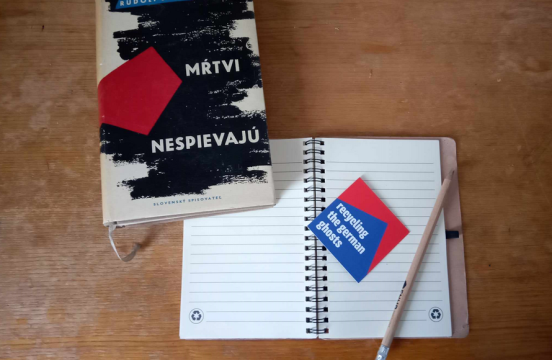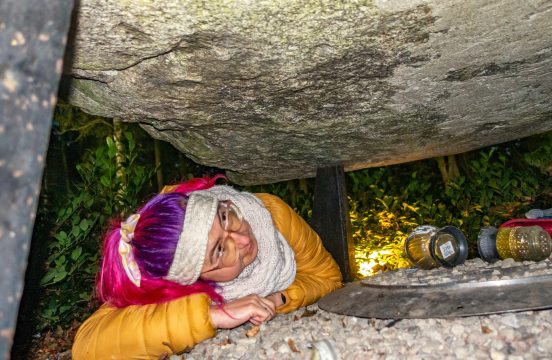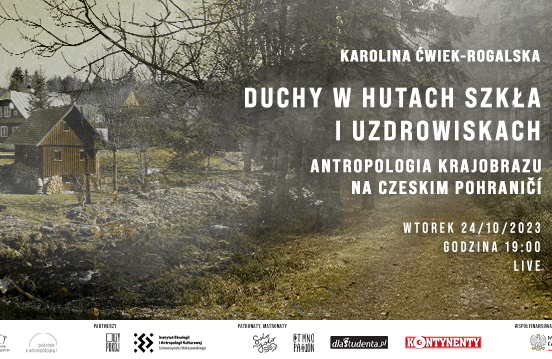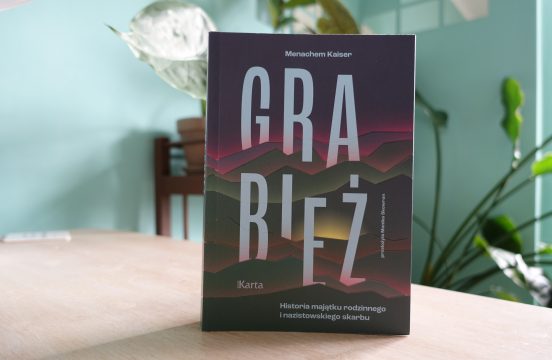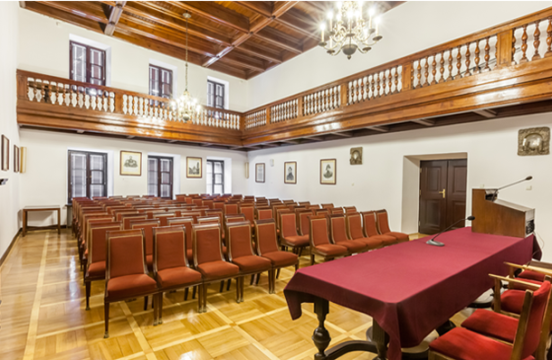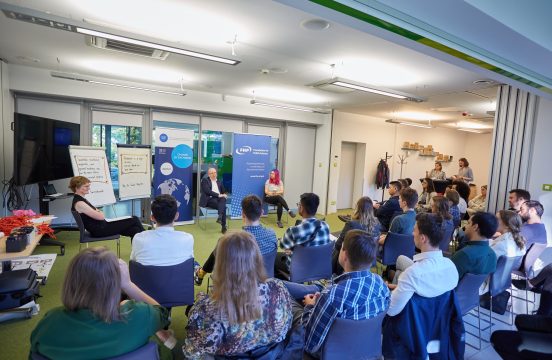At the end of October, our team experimented with a new genre for our regular seminar. This time we gathered to discuss a movie: we talked about a Slovak TV movie Mŕtvi nespievajú (The Dead Don’t Sing, dir. Andrej Lettrich) that was released in 1965. It is an adaptation of an unfinished trilogy of novels by Rudolf Jašík. Both the novels and the movie follow several families in the small town of Deutsch Proben, or nowadays Nitrianské Pravno, an ethnically mixed town in Central Slovakia where our team member, Karina Hoření, is currently doing her fieldwork. In the movie which takes place during World War II, ethnic (i.e. German, Slovak, Jewish) and political (i.e. communist, collaborant, anarchist) identities merge to create a kaleidoscope of strategies for coping with the ethical challenges of the war. The movie is interesting in overcoming the dominant ideological narrative of the 1950s and showing complicated characters of all the ethnicities. The analysis of these motives within the movie during a lively discussion among team members persuaded us that we should include more movies in our seminar schedule.
News
Podcast (in Polish) – NCN Award
In this episode of NCN’s podcast, you can find out more about the most prestigious distinction for early-stage researchers working in Poland – NCN Award. Karolina Ćwiek-Rogalska won the NCN Award for defining a new category of resettlement cultures in the research on post-displacement areas.
Karolina and Prof. Joanna Golińska-Pilarek, member of the NCN Council and NCN Award jury panel, talk to Anna Korzekwa-Józefowicz about this year’s awards and research conducted by Karolina.
Link to podcast you can find here.
Partial Team Meeting in Goleniów and Szczecin
As each of our researchers conducts their research in two different geographical contexts, they always share one country together. That is why they can meet up during their fieldwork and discuss their research on site. It happened in summer in Slovakia where Karin and Michal had an opportunity to meet, and it took place also in October 2023. This time, our researchers Karolina and Michal met in Goleniów and Szczecin.
On the first day, Michal showed Karolina around Goleniów and presented her his findings. They started in the forest-like park named after the Polish composer and politician Ignacy Jan Paderewski right next to the train station. The park is home to many monuments commemorating various historical events or persons, Polish as well German ones. Thus, some of them are recycled, i.e. made from older monuments. Later that day they ended up exploring one more recycled monument that can be found on the premises of the former German cemetery (nowadays a park).
In Goleniów, our researchers cooperate with local history enthusiasts and artists in the project Goleniowskie Fotohistorie. Based on photographs and family histories this project sheds light on the post-WWII history of Goleniów and its Polish settlers. While in Goleniów, Karolina conducted a video interview for the project. Furthermore, our researchers met with other team members and discussed currents issues as well as future aims of the local project.

Last but not least, Karolina and Michal looked for and found some formerly German fruit trees in the cityscape of Goleniów.

On the next day, the partial team meeting continued in Szczecin, where our researchers visited two museums as a part of the preparation for the 6th Congress on Polish Studies in Dresden (more information coming soon). Karolina and Michal focused on the way the museums deal with formerly German objects in their exhibitions. First, they visited the Szczecin History Museum and afterwards the Dialogue Centre “Przełomy”. Both exhibitions have different concepts. While the Szczecin History Museum has a rather traditional exhibition dominated by a large number of original objects from its collection, the “Przełomy” overwhelms the visitor with multimedia and focuses on evoking emotions. In both museums there are formerly German objects as a part of the exhibitions. However, only in a few cases the visitor gets an information about the origin of the objects or their purpose as a part of the exhibition. This creates a rather blurry image of the pre-WWII history of the city. Michal plans to discuss this issue in his upcoming presentation in Dresden.
“Ghosts in glass factories and health resorts. Anthropology of landscape in the Czech pohraničí” – lecture with discussion by Karolina Ćwiek-Rogalska – video recording (in Polish)
How to research what no longer exists: disappeared villages, buildings where the wind blows through broken windows, cemeteries where tombstones have sunk into the ground under the weight of time or have been taken away? After 1945, Central and Eastern Europe became a space of mass displacement. One of the groups that was supposed to disappear from there were the Germans. In former Czechoslovakia, the displacement of German-speaking communities had a special significance: it marked the end of centuries of coexistence of two cultures, developing interdependently.
Karolina Ćwiek-Rogalska has addressed these questions during her lecture, held as part of the “Podróże z antropologią” series (Travels with Anthropology), a project of the Stowarzyszenie Pracownia Etnograficzna. The lecture was entitled “Ghosts in glass factories and health resorts. Anthropology of landscape in the Czech pohraničí” and took place on October 24, 2023. Karolina talked about her fieldwork in Czechia, focusing on the themes connected to particular spaces: the glass factories in Krkonoše region she currently studies, and health resorts in Mariánskolázeňsko region she studied during her PhD.
You can watch the recording on Facebook of the Pracownia Etnograficzna here and get to know more about Czech regions where the German inhabitants were displaced and new settlers came.
Interview in Slovak – Michal Korhel about Spectral Recycling project
The town of Krickerhau does not exist on the map, yet it is in Slovakia. Krickerhau is the old German name of Handlová. The city was founded by German colonists and their descendants lived there for a long time. The end of World War II marked a radical change: most of the original German population was deported to Germany. But the traces left by previous inhabitants can still be visible there.
While doing research in Handlová our researcher, Michal Korhel, not only conducted interviews, but also gave one to a local radio station. Michal spoke about the Spectral Recycling project, its aims as well as its impact on the local society. Additionally, he presented his first findings from Handlová. You can listen to the whole interview in Slovak under the link here.
Book discussion: Menachem Kaiser’s “Plunder. A Memoir of Family Property and Nazi Treasure”
At the beginning of October, our team delved into the narrative of Menachem Kaiser’s “Plunder. A Memoir of Family Property and Nazi Treasure” (it was translated by Monika Skowron and published in Polish as “Grabież. Historia majątku rodzinnego i nazistowskiego skarbu” by Ośrodek Karta). This thought-provoking autobiographical essay presents the author’s journey as a “memory tourist”, i.e. someone trying to persuade the place to reveal the buried secrets and find the myth of a place, someone trying to find and speak to ghosts. In Kaiser’s case, he wants to find a house in Sosnowiec (in Upper Silesia, Poland), supposedly belonging to his grandfather in the past, before World War II. The main theme is Kaiser’s search to unravel the story of his grandfather in the context of the complex past of the region and of the people living there. Kaiser trusts that his search will not be fruitless and will help him understand his own roots.
Our team explored the challenges Kaiser faced as he sought to understand his family’s history, but also himself. We followed him, as he tried to reclaim his grandfather’s tenement house while dealing with the consequences of the war and the complexities of his identity. The team considered what aspects of “Plunder” could be applied to our work and how the lessons from Kaiser’s exploration of family history and cultural heritage might expand our understanding of searching for traces of the past.
Overall, reading “Plunder” together was a valuable meeting. We could explore such themes as the multilayered history of Silesia as an example of a post-displacement region, the issue of mixed identity, and the intricate connections between past and present. Moreover, we have learned from Menachem Kaiser’s travels as an example of semi-ethnographic writing. Therefore, we encourage you to read our blog entries, which show how we try to research and understand the relationship between the past and the present.
Karolina Ćwiek-Rogalska is a winner of the NCN Award
We are proud to announce that our PI, Karolina Ćwiek-Rogalska, is a winner of the NCN Award!
Ceremony was held in the Gallery of 19th-century Polish Art in the Sukiennice, part of the National Museum in Kraków. As always, the ceremony was hosted by Grażyna Torbicka.
The NCN Award is given to researchers under the age of 40, who are affiliated with Polish research institutions and boast a strong basic research and publication record in one of the following three panels: Arts, Humanities and Social sciences (HS), Physical Sciences and Engineering (ST), and Life Sciences (NZ). The main criteria for the selection process are scientific excellence and international recognition.
The jury consists of NCN Council Members and the NCN Director. This year, nearly 700 people were eligible to nominate candidates including, e.g., previous NCN Award winners, former NCN Council members and other outstanding researchers. An important condition is that they have not collaborated, taken part in any joint endeavours or published a paper together in the past 5 years. In addition, they should not have any familial or professional relationship and researchers cannot nominate their current or former PhD students. This year, the NCN received 53 nominations, including 44 candidates (some were nominated by more than one person). Nominees include 20 researchers in Physical Sciences and Engineering, 16 in Arts, Humanities and Social Sciences and 8 in Life Sciences.
In the weeks that follow, winners will deliver a series of lectures, we will let you know where you can find it. Now, more about award and this year’s winners you can read here.
Inauguration at the Anthropos Doctoral School
The Anthropos Doctoral School recently celebrated the commencement of the academic year with an engaging kick-off event held at the Lelewel hall in the Old Town Market, Warsaw. The event was not only a collective welcome to the new academic year but also marked the induction of Magdalena Bubík, our team colleague, as a fresh addition to the doctoral student community.
We believe that, accompanied by her supervisors, Nicole Dołowy-Rybińska and Karolina Ćwiek-Rogalska, Magdalena is set to embark on an academic journey at the Anthropos. During the inauguration, it was highlighted that she joins a dynamic cohort of 13 colleagues from diverse fields, including archaeology, literary studies, and history. This diversity promises a rich environment for intellectual exchange and broadening perspectives.
We wish Magdalena and her fellow doctoral candidates success in their academic pursuits at the Anthropos Doctoral School.

How to write effective international grant applications – FNP and DAAD workshops for PhD students
The Foundation for Polish Science (FNP), together with the German Academic Exchange Service (DAAD) in Poland, co-organized training for doctoral students devoted to writing effective international grant applications.
Karolina Ćwiek-Rogalska shared her experience in preparing the ERC application, while Wojciech Święszkowski talked about his role as a reviewer in the ERC. The discussion with both invited guests was a part of the workshop on writing effective grant applications, conducted by an expert from Germany, Dr. Sabine Preusse. Since the issues regarding writing grant applications are a common challenge for young scientists at an early stage of professional development, sharing knowledge and expertise in funding opportunities at the European level provides a valuable opportunity for PhD candidates.
The workshop was held on September 29, 2023 in Warsaw.
New blog post (in Slovak)! Ignorovaná pamäť Slovenského národného povstania: marginalizácia násilia voči nemeckému civilnému obyvateľstvu a jej dôsledky
After the Warsaw Uprising, the Slovak National Uprising was the largest anti-Nazi insurrection in Central Europe. It is a crucial event in Slovak modern history as well as in the country’s culture of remembrance regarding WWII. As such it has its own museum and central memorial in Banská Bystrica, the center of the anti-Nazi resistance during the uprising. Even though the insurrection was suppressed in less than two months, it helped the Allies in the fight against Nazi Germany. Its significance on a moral and political level was central: part of the Slovak nation rose up against the authoritative regime of the First Slovak Republic, a client state of Nazi Germany, in order to restore democracy. However, it also has its negative aspects, such as the treatment of the German civilian population by the partisans. The most tragic event in this regard took place in the predominantly German village of Sklené / Glaserhau. On 21 September 1944, under the pretext of digging trenches, the partisans took about 300 men between 16 and 60 years of age from the village and shot 187 of them at the edge of a nearby forest. In 1994, 50 years later, a monument of the Sklené massacre was established on the mass grave of its victims. Nevertheless, as the historical narrative presented in the current exhibition in the Museum of the Slovak National Uprising shows, the memory of the violence against the German civilian population is being marginalized. This process enables far-right groups and political parties glorifying the First Slovak Republic to take over the memory of murdered Germans and in doing so also instrumentalize the narrative of the whole uprising.
You can read blog post in Slovak here.

